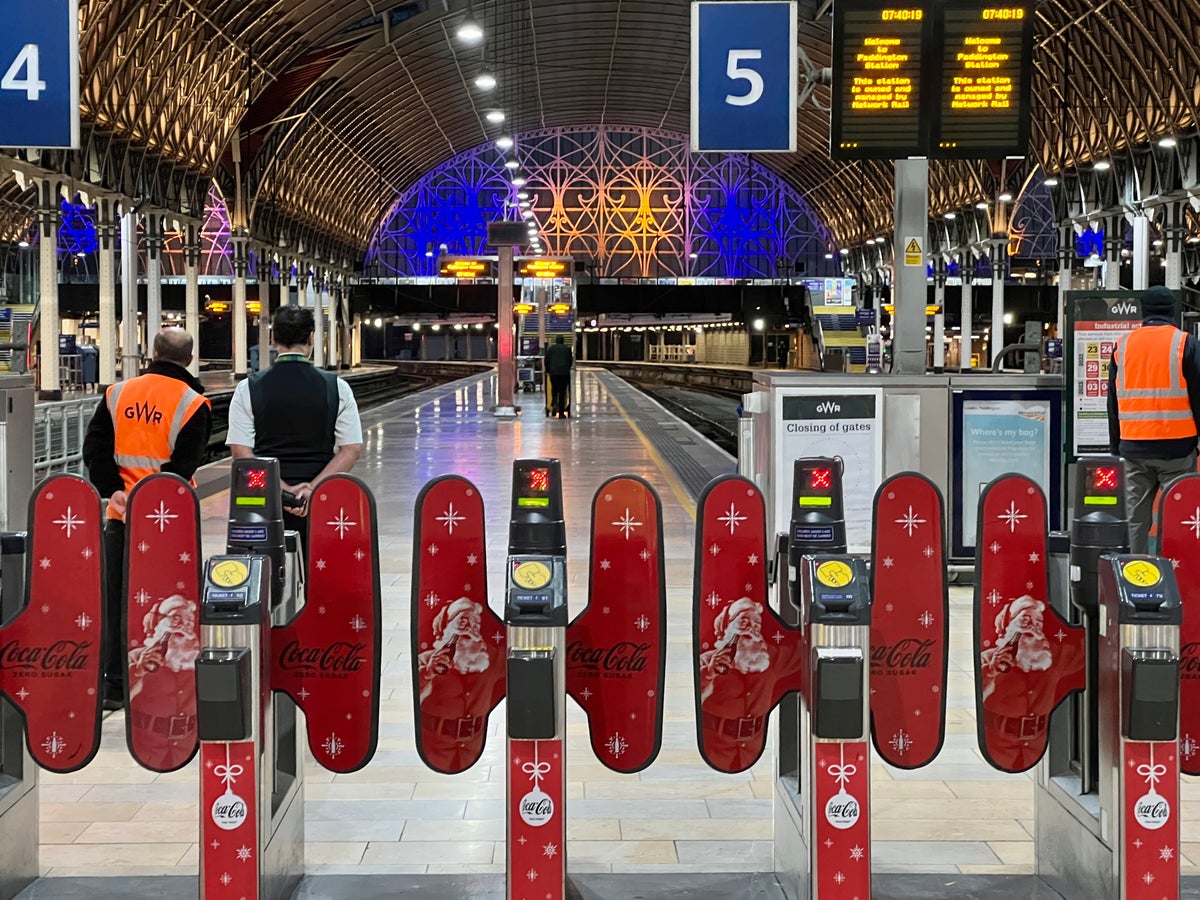
As the latest national rail strike ended, passengers the length and breadth of Britain found the nation’s trains in disarray.
The four-day stoppage by members of the RMT union working for Network Rail ended at 6am.
At London Paddington station, hub for Great Western Railway services to the West of England and South Wales, as well as the Heathrow Express, a steady stream of would-be passengers were turned away. Many had pre-booked tickets for trains that had been cancelled.
Juliet, a traveller to Wilmslow in Cheshire, was hoping to travel via Oxford to avoid the closure of the West Coast main line, and had an advance ticket for the whole journey. But her train, the 8.20am, was cancelled – leaving her uncertain about whether she would be able to complete the journey without buying a new ticket.
“I think we’ve had enough of strikes now,” she said.
The expected first departure nationwide, the 7.53am CrossCountry express from Sheffield to Plymouth, was cancelled late on Boxing Day – believed to be as a result of a fresh 24-hour strike by members of the white-collar TSSA rail union.
The 7.59am from Edinburgh Waverley to Glasgow Queen Street was the next train due to depart, but it was cancelled due to a signalling problem.
The 8.01am from London St Pancras to Paris was then delayed, which meant the first “train” to run was a rail replacement bus from Manchester Piccadilly to the city’s airport, at 8.05am.
Many other trains are starting much later – with passengers between London, Gatwick airport and Brighton not able to travel by train until early afternoon.
An overtime ban by members of the RMT union continues, leading South Western Railway to axe trains on some stretches of its lines in Surrey and to close some busy stations in southwest London.
The next national strikes begin in a week. Forty-eight hour stoppages are scheduled for 3-4 and 6-7 January by the RMT, with train drivers belonging to the Aslef union walking out on the day in the middle, Thursday 5 January.
Meanwhile the war of words between the RMT, the employers and the government has intensified.
Just ahead of the latest walk-out, the union said it was available for talks but that ministers had “gone missing”.
The RMT general secretary Mick Lynch said: “Until the government gives the rail industry a mandate to come to a negotiated settlement on job security, pay and conditions of work, our industrial campaign will continue into the new year, if necessary.”
On Tuesday morning, the Rail Delivery Group (RDG), representing train operators, reiterated its insistence that the dispute would be settled only if the unions agreed to changes “needed to put the industry on a sustainable footing”.
Daniel Mann, director of industry operations at the RDG said: “No one wants to see these strikes go ahead, and we can only apologise to passengers and to the many businesses who will be hit by this unnecessary and damaging disruption.
“We would advise passengers to only travel if it is absolutely necessary during this period, allow extra time and check when their first and last train will depart.
“This dispute will only be resolved by agreeing the long overdue reforms to working arrangements.”
The TSSA union has further strikes planned before the end of the year. The CrossCountry walk-out ends at 9pm on Tuesday. TSSA members working for Great Western Railway and West Midlands Trains will stop work for 24 hours from 12 noon on Wednesday 28 December.
West Midlands Trains and its sister operator London Northwestern Railway say no trains will run on Wednesday or Thursday “as a result of additional industrial action by the TSSA union”.
Nadine Rae, the union’s organising director, said: “The government has left rail workers with no other choice as a result of their anti-worker agenda blocking talks.”
“The cost-of-living crisis is crippling household finances on top of years of pay freezes. We hope that the government makes a New Year’s Resolution to give employers a free hand to negotiate a deal which meets our aspirations and resolves this dispute.”
Network Rail at Euston station in London has warned passengers not to attempt to travel by train on the West Coast main line before 9 January “unless absolutely necessary”.







